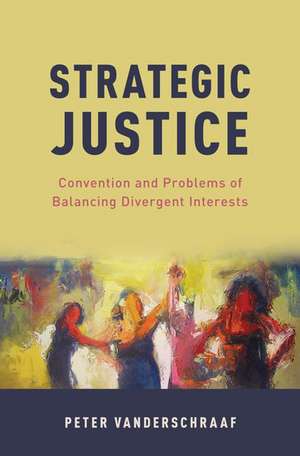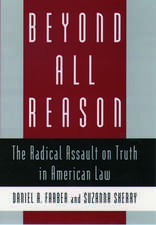Strategic Justice: Convention and Problems of Balancing Divergent Interests: Oxford Moral Theory
Autor Peter Vanderschraafen Limba Engleză Hardback – 10 ian 2019
Din seria Oxford Moral Theory
- 23%
 Preț: 404.20 lei
Preț: 404.20 lei - 22%
 Preț: 457.66 lei
Preț: 457.66 lei - 28%
 Preț: 363.13 lei
Preț: 363.13 lei - 23%
 Preț: 471.18 lei
Preț: 471.18 lei - 41%
 Preț: 487.92 lei
Preț: 487.92 lei - 12%
 Preț: 333.35 lei
Preț: 333.35 lei - 14%
 Preț: 257.04 lei
Preț: 257.04 lei - 13%
 Preț: 279.89 lei
Preț: 279.89 lei - 30%
 Preț: 494.04 lei
Preț: 494.04 lei - 30%
 Preț: 493.62 lei
Preț: 493.62 lei - 30%
 Preț: 492.81 lei
Preț: 492.81 lei - 16%
 Preț: 278.46 lei
Preț: 278.46 lei - 28%
 Preț: 491.43 lei
Preț: 491.43 lei - 18%
 Preț: 336.97 lei
Preț: 336.97 lei - 26%
 Preț: 556.55 lei
Preț: 556.55 lei
Preț: 501.92 lei
Preț vechi: 682.20 lei
-26% Nou
Puncte Express: 753
Preț estimativ în valută:
96.04€ • 100.53$ • 79.94£
96.04€ • 100.53$ • 79.94£
Carte tipărită la comandă
Livrare economică 20-26 martie
Preluare comenzi: 021 569.72.76
Specificații
ISBN-13: 9780199832194
ISBN-10: 0199832196
Pagini: 416
Dimensiuni: 236 x 163 x 36 mm
Greutate: 0.68 kg
Editura: Oxford University Press
Colecția OUP USA
Seria Oxford Moral Theory
Locul publicării:New York, United States
ISBN-10: 0199832196
Pagini: 416
Dimensiuni: 236 x 163 x 36 mm
Greutate: 0.68 kg
Editura: Oxford University Press
Colecția OUP USA
Seria Oxford Moral Theory
Locul publicării:New York, United States
Recenzii
Peter Vanderschraaf's Strategic Justice is the culmination of one of the major philosophical projects of the second half of the twentieth century. The basic thought is compelling: perhaps social morality can be either derived from, or reconciled with, the best strategy for each rational agent to promote her own interests in cooperative contexts ... Vanderschraaf has a better grasp of the philosophical and game theoretic background than any previous exponent, and builds on this to yield some stunning innovations and insights. Strategic Justice is a tremendous achievement -- it requires hard work and careful study, but the rewards are great.
Peter Vanderschraaf's Strategic Justice is a brilliant and bold book ... He uses technical tools with expert precision leading to compelling philosophical conclusions. In short, Vanderschraaf's book is an example of PPE at its best.
Vanderschraaf sets out to develop an account of justice-as-convention, which is a form of justice-as-mutual-advantage. He certainly achieves this: the book provides a coherent and admirable account of why it is that rational agents might find it in their interest to share resources in an egalitarian fashion ... [this] is an important and impressive contribution to the literature on justice.
For twenty years, Peter Vanderschraaf has been writing important papers about conventions. His new book, Strategic Justice, synthesises this body of work and displays his ability to write both as a scholarly philosopher and as a rigorous game theorist.
Peter Vanderschraaf's Strategic Justice is a brilliant and bold book ... He uses technical tools with expert precision leading to compelling philosophical conclusions. In short, Vanderschraaf's book is an example of PPE at its best.
Vanderschraaf sets out to develop an account of justice-as-convention, which is a form of justice-as-mutual-advantage. He certainly achieves this: the book provides a coherent and admirable account of why it is that rational agents might find it in their interest to share resources in an egalitarian fashion ... [this] is an important and impressive contribution to the literature on justice.
For twenty years, Peter Vanderschraaf has been writing important papers about conventions. His new book, Strategic Justice, synthesises this body of work and displays his ability to write both as a scholarly philosopher and as a rigorous game theorist.
Notă biografică
Peter P. Vanderschraaf is Professor of Philosophy at the Department of Political Economy and Moral Science at the University of Arizona. He works in social philosophy and game theory. He has held visiting appointments at the University of North Carolina at Chapel Hill, Boston University, and the School of Social Sciences of the Institute for Advanced Study.























